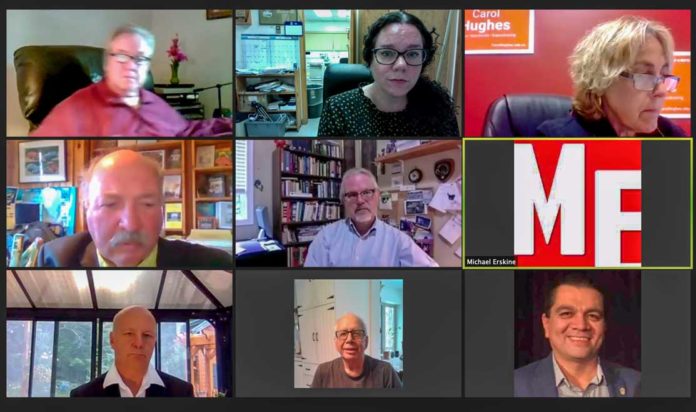MANITOULIN—The Canadian Red Cross (CRC) has added training to identify and respond to opioid poisoning in all its first aid and cardiopulmonary resuscitation (CPR) programs in Canada, it announced last week. This is part of a series of measures funded by Health Canada’s Substance Use and Addictions Program (SUAP) to help reduce opioid-related deaths by increasing access to response training and a life-saving medication that buys those affected enough time for medical attention.
“All of the courses for the last five plus years have had at least one slide about opioid poisoning,” said Alie Thompson of Manitoulin Training Solutions (MTS). MTS offers a variety of first aid and CPR training courses as a Canadian Red Cross Training Partner.
For several months there has been a whole chapter about opiate poisoning and naloxone in every first aid and CPR course that Red Cross offers. “It’s an important topic and it’s a very matter of fact topic,” she said. “It exists. It’s out there. It’s happening. But I find a lot of people are receptive to the training.”
The course talks about what an opiate is and what it does in the body, Ms. Thompson said. “We identify it as a central nervous system depressant and say, ‘here are some of the symptoms you’ll be looking for.’ ‘Here’s what you do if someone is still responding and they’re breathing,’ and ‘here’s what you should do if they’re not breathing.’ Then we talk about the kit and explain how to administer naloxone.”
Between January 2016 and December 2020 there were more than 21,000 apparent opioid toxicity deaths in Canada, with 97 percent happening by accident. The crisis has worsened since the onset of COVID-19 with 6,214 deaths recorded in 2020 alone.
“Research suggests the crisis is hitting smaller communities the hardest,” stated Conrad Sauvé, president and CEO of the CRC. “In fact, analysis from the Canadian Institute for Health Information found communities of 50,000 to 99,000 people had rates of opioid-related hospitalizations more than twice that of cities with populations over 500,000.”
CRC will receive $7.9 million over the next three years from SUAP to work in parallel with St. John Ambulance to deliver opioid poisoning education and response training through multiple platforms and to develop and maintain a system to provide Canadians with ready access to naloxone, a medication that temporarily reverses some of the life-threatening effects of opioid poisoning.
“I’m a huge supporter of the (naloxone) kit,” Ms. Thompson said. “Go to the pharmacy. Go to public health. They’re free. They don’t track you. You don’t have to say your name. It can be as anonymous as you want.” She said that while she uses a fake naloxone nasal spray kit in her courses, she always tells people to have the pharmacist or public health walk them through how to use it in case it’s slightly different. “Most of them are the same, and they’re moving to the nasal spray because it’s the easiest to use, with less risk and no needles, but it could be a year from training that they decide they want a harm reduction kit and it could be a little different.” People should also make sure that when they get a kit, they are comfortable with using it, she added.
There is also a standalone opiate awareness program offered for groups or organizations. There is no first aid component to it, Ms. Thompson said. “It’s literally just a talk about opiate awareness, opioid poisoning, that kind of thing.” She hasn’t done any standalone training on the Island yet, partly because it’s already offered within every first aid or CPR course, but also because it’s fairly new. There would be a minimum of seats to cover costs but other than that, any business, organization or community group could contact MTS to set one up.
Red Cross will add self-directed online opioid poisoning response training to its offerings in 2022 with the platform also allowing for the ordering of naloxone kits. Altogether, CRC expects to provide the training to 1.5 million Canadians over the next three years, “while helping millions more to better understand the risks, stigmas, misconceptions and vulnerabilities of opioid misuse,” according to the statement.
To register for Red Cross first aid and CPR courses including opioid poisoning response training, visit myrc.redcross.ca or manitoulintrainingsolutions.ca for a list of courses provided on Manitoulin Island and surrounding areas, with available dates.






